Ultraviolet (UV) radiation from the sun can cause premature aging, skin cancer, and other health conditions. Scary stuff, right?
Luckily for literally all of us, using sunscreen on the daily can help prevent this.
But keep in mind that not all sunscreens are created equal. And different sunscreens are designed to meet different skin needs.
Not sure which sunscreen brand to reach for? Don’t worry. We’ve got you — and your skin — covered! Here’s the ultimate breakdown of the best sunscreens for all skin types, body parts, and budgets.
A quick look at the best sunscreens
- Best drugstore sunscreen: Neutrogena Hydro Boost Water Gel Lotion
- Best spray sunscreen: Supergoop! Play Antioxidant Body Mist
- Best sunscreen for young ones: Aveeno Baby Continuous Protection Zinc Oxide Sunscreen
- Best mineral sunscreen for face: Bare Republic Mineral Face Sunscreen Lotion
- Best sunscreen for rosacea: La Roche-Posay Anthelios Tinted Mineral Ultra-Light Sunscreen
- Best mineral sunscreen for body: Colorescience Sunforgettable Total Protection Body Shield
- Best reef-friendly sunscreen: Thinksport Safe Sunscreen SPF 50+
- Best body sunscreen for sensitive skin: La Roche-Posay Anthelios Melt-In Milk Sunscreen
- Best face sunscreen for sensitive skin: Dermalogica Super Sensitive Shield SPF 30
- Best sunscreen for darker skin tones: Black Girl Sunscreen
- Best powder sunscreen: Colorescience Sunforgettable Total Protection Brush-On Shield
- Best sunscreen for oily and acne-prone skin: EltaMD UV Clear Facial Sunscreen Broad Spectrum
- Best scalp sunscreen: Supergoop! Poof 100% Mineral Part Powder SPF
- Best sunscreen for under makeup: Glossier Invisible Shield Daily Sunscreen
How we chose the best sunscreens
Here’s how we decided which sunscreens made the cut:
- SPF. Obvi, a sunscreen should actually protect you from the sun. The American Academy of Dermatology (AAD) recommends using a sunscreen with an SPF (sun protection factor) of 30 or higher, so we didn’t include any products with lower SPF than that.
- Water resistance. Another sunscreen quality the AAD says is important: water resistance. A definite no-brainer if you’re gonna be around water. Most products on our list are water-resistant, but we’ve noted any that aren’t.
- Variety. Our list includes a variety of sunscreen options, including sports-ready formulas, budget picks, products for darker skin tones, and products made especially for the delicate skin on your face. We also made sure to include both spray and lotion options.
- Broad-spectrum. Another rec from the AAD is that your sunscreen should offer broad-spectrum protection (against both UVA and UVB rays).
- Customer reviews. We dug into user reviews to find products that people legit have heart eyes for. 😍
Terms to know: Chemical vs. mineral sunscreens
Chemical sunscreens are made with ingredients such as oxybenzone, avobenzone, octinoxate, homosalate, octocrylene, and octisalate. These ingredients absorb UV rays before they can leak into your skin.
Mineral sunscreens (aka physical sunblocks) have active ingredients like titanium dioxide and zinc oxide. These minerals may help deflect UVA and UVB rays. They’re also dope for sensitive skin.
Pricing guide
The pricing guide uses the following scale:
- $ = under $5 per ounce (oz.)
- $$ = $5–$10 per oz.
- $$$ = $11–$20 per oz.
- $$$$ = over $20 per oz.
The best sunscreens for every need
Best drugstore screen
Neutrogena Hydro Boost Water Gel Lotion

- Price: $
- SPF: 50
- Chemical or mineral: chemical
- Active ingredients: avobenzone (2.7 percent), homosalate (9 percent), octisalate (5 percent), octocrylene (9 percent)
- Broad-spectrum: yes
- Water-resistant: yes
- Pros: water-based, with a refreshing, nongreasy feel
- Cons: probably not a good option for people with seriously sensitive skin
For the best bang for your buck, it doesn’t get much better. This thin, water-based sunscreen soaks in fast and won’t make you greasy. Plus, it has a nice light floral scent that won’t overwhelm.
It’s a killer choice if you have dry skin. Your skin should feel fresh and dewy after every use thanks to hyaluronic acid (HA). HA is a humectant, which means it keeps moisture locked in and prevents skin from drying out.
Customers say the Hydro Boost formula smells great and works well for darker skin tones because it doesn’t leave behind a white sheen. A handful of people complain that the product causes breakouts, but they’re few and far between.
Best spray sunscreen
Supergoop! Play Antioxidant Body Mist
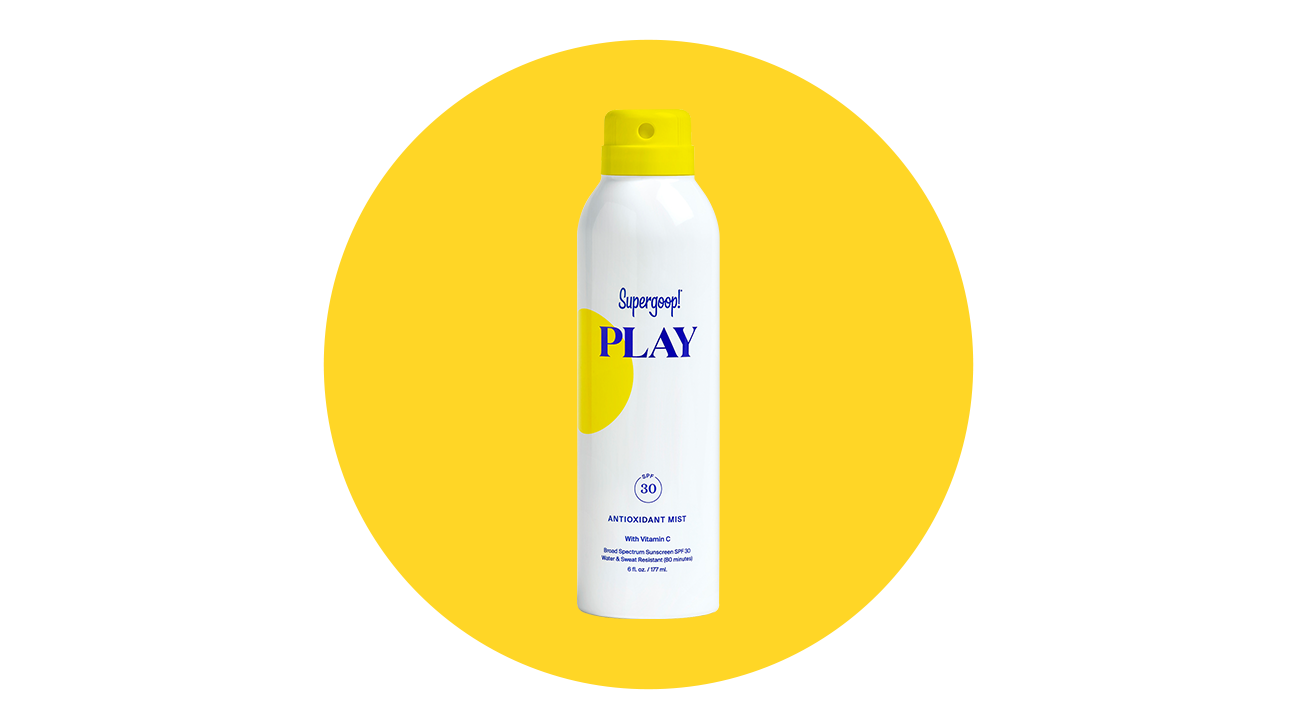
- Price: $
- SPF: 30
- Chemical or mineral: chemical
- Active ingredients: avobenzone (2.8 percent), homosalate (9.8 percent), octisalate (4.9 percent), octocrylene (9.5 percent)
- Broad-spectrum: yes
- Water-resistant: yes
- Pros: great scent, easy to apply
- Cons: hard to wash off
Protect your skin on the go with this broad-spectrum spray. We love it because it’s a two-fer: It’s SPF 30 (and available in SPF 50, too) and boasts a bunch of antioxidants like vitamin C, which studies show can reduce UV-induced photodamage. Two birds, one stone.
More good news: No need to ask someone to put sunscreen on your back — the spray makes it easier to get those hard-to-reach spots.
Keep in mind that it can be tough to figure out how much spray sunscreen to use. Make sure you apply it evenly and often before you roll out.
People love this great-smelling sunscreen spray, but several reviewers point out that it’s a bit tough to wash off. It’s probably a good choice for sweaty pursuits, but skip it for sunny outings that don’t involve running a 5K or wading in the water.
Want more sunscreen sprays? Check out our full roundup here.
Best sunscreen for young ones
Aveeno Baby Continuous Protection Zinc Oxide Sunscreen
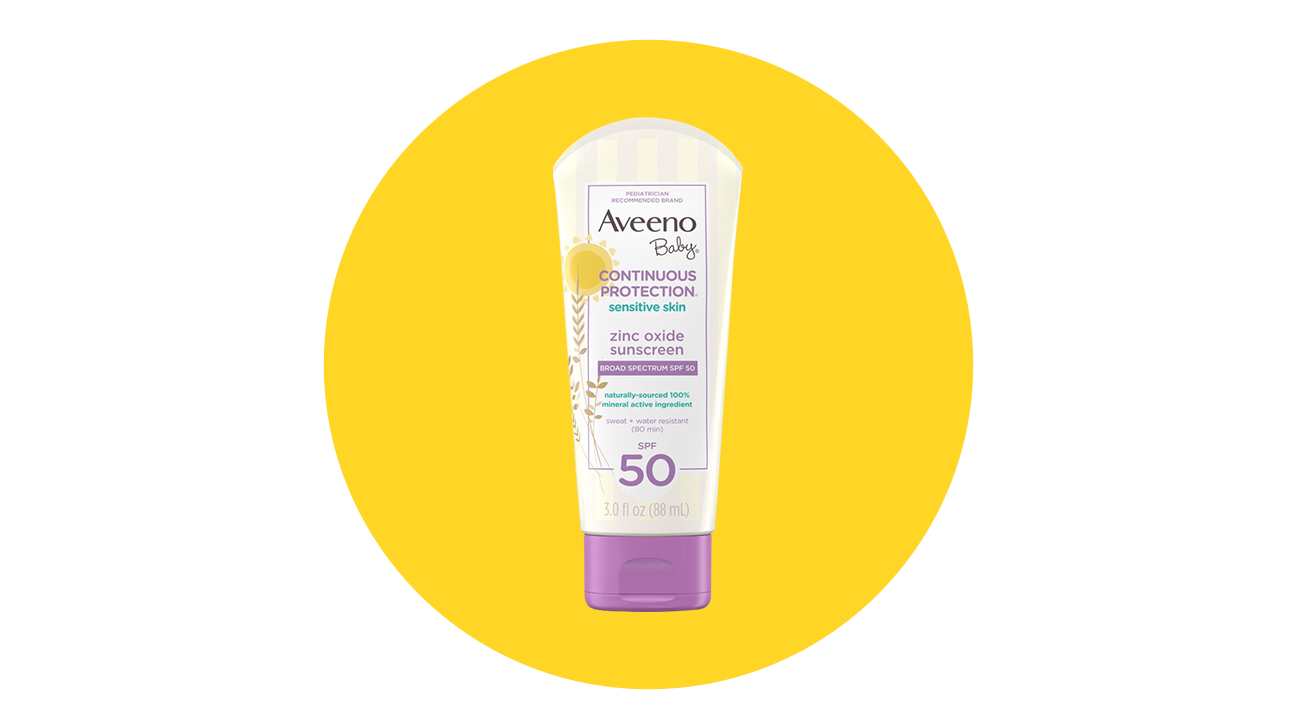
- Price: $
- SPF: 50
- Chemical or mineral: mineral
- Active ingredient: zinc oxide (21.6 percent)
- Broad-spectrum: yes
- Water-resistant: yes
- Pros: great coverage, super gentle formula
- Cons: leaves a white film because of the zinc oxide
Bébés and kiddos need more protection from Mr. Sun than adults do. This lotion offers excellent sun protection and is perf for sensitive, delicate skin.
Note: The FDA doesn’t recommend applying sunscreen on kids younger than 6 months. Keep ’em out of the sun and protect with clothing/hats!
Experts claim this sunscreen is also fab for folks with eczema and other skin conditions. It has received kudos from both the National Eczema Association and the Skin Cancer Foundation.
Reviewers like that it’s nongreasy, easy to apply, and very gentle on sensitive baby skin. And BTW, you don’t have to be a bébé to use this.
Best mineral sunscreen for face
Bare Republic Mineral Face Sunscreen Lotion
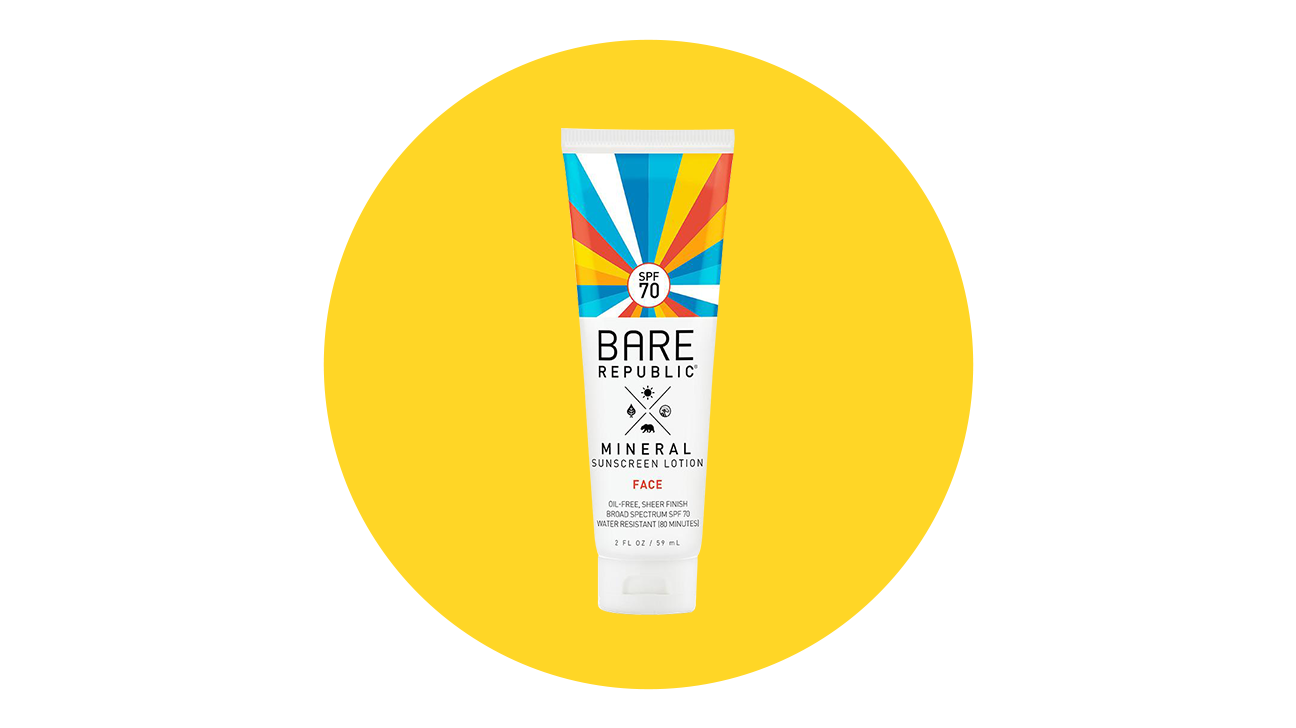
- Price: $$
- SPF: 70
- Chemical or mineral: mineral
- Active ingredient: titanium dioxide (3.5 percent), zinc oxide (15.8 percent)
- Broad-spectrum: yes
- Water-resistant: yes
- Pros: affordable, stays put under makeup, and doesn’t run (even if you are)
- Cons: not ideal for darker skin tones
This mineral-based sunscreen offers protection from UVB and UVA rays. It also has natural extracts — like raspberry, grape, and carrot seed — that can help fight free radicals. If you want something lower than SPF 70, it also comes in SPF 30.
Reviewers with oily skin say they like this formula because it doesn’t up the grease factor, even when layered under makeup. Some peeps with redness-prone skin like that the white sheen helps cover a ruddy complexion.
A minor note: Some reviewers said they didn’t dig the vanilla-coconut scent. And some say it’s a pain in the ass to wash off.
Best sunscreen for rosacea
La Roche-Posay Anthelios Tinted Mineral Ultra-Light Sunscreen
- Price: $$$$
- SPF: 50
- Chemical or mineral: mineral
- Active ingredient: titanium dioxide (11 percent)
- Broad-spectrum: yes
- Water-resistant: yes
- Pros: safe for super sensitive skin, tinted to help cover blemishes or even out skin tone
- Cons: a little hard to wash off
If you have rosacea, you know that the sun is the enemy. Just a few minutes of direct sun exposure can quickly turn you into Rudolph the Red-Nosed Reindeer and leave your face burning for hours.
This super gentle mineral sunscreen is perfect for people with rosacea, thanks to its gentle and slightly tinted formula. It’s also unscented, which is a win if you’re smell-averse.
The dermatologist-recommended sunscreen isn’t just for folks with rosacea, though. Anyone with sensitive skin can use it. It has a matte finish and works well under makeup.
FYI: The tint is a little on the orange side, and you’ll need a powerful makeup remover to wash this stuff off.
Best mineral sunscreen for body
Colorescience Sunforgettable Total Protection Body Shield
- Price: $$$
- SPF: 50
- Chemical or mineral: mineral
- Active ingredient: zinc oxide (12 percent)
- Broad-spectrum: yes
- Water-resistant: yes
- Pros: super-fluid formula, nongreasy
- Cons: expensive, leaves a white residue on some skin tones
This silky formula is a creamy way to protect your skin. Reviewers say it spreads on smoother than a lot of other zinc oxide formulas. It should blend nicely into any skin tone without leaving a white residue.
It’s also on the Skin Cancer Foundation’s list of recommended products to prevent skin cancer. Woot!
Customers say it’s worth the steep price and that it has a great spreadable texture. A few people complain that it leaves a white residue, but the good news is that it’s not super greasy.
Best reef-friendly sunscreen
Thinksport Safe Sunscreen SPF 50+

- Price: $
- SPF: 50
- Chemical or mineral: mineral
- Active ingredient: zinc oxide (20 percent)
- Broad-spectrum: yes
- Water-resistant: yes
- Pros: reef-safe, relatively affordable, has a pleasant smell
- Cons: tough to apply
Sorry, Flipper — some sunscreens can hurt marine life. Chemical sunscreens often contain oxybenzone and octinoxate, which can damage coral. Even if you splish-splash far from reefs, the chemicals in sunscreen can eventually make their way into vulnerable marine ecosystems, so stick to mineral-only sunscreen when you swim with the fishes.
Thinksport Safe Sunscreen SPF 50+ is terrific because it uses non-nano zinc, which is reef-friendly. It won’t leave you feeling greasy, and it’s pretty darn affordable compared with other reef-friendly brands.
The water-resistant formula stays put come rain or come sweat, so you can train for that triathlon without getting sidelined by a bad burn.
It’s a little thicker than other sunscreens, and some reviewers say it’s a bit hard to spread, but it’s gentle AF and doesn’t have an off-putting scent. Plus, people love that it’s safe to wear when swimming in the ocean. Time for vacay!
Note: You don’t have to rely only on sunblock. You can also wear a rash guard, a T-shirt, or other protective clothing to block out UV rays while still protecting the fishies.
Best body sunscreen for sensitive skin
La Roche Posay Anthelios Melt-In Milk Sunscreen

- Price: $$
- SPF: 60
- Chemical or mineral: chemical
- Active ingredients: avobenzone (3 percent), homosalate (15 percent), octisalate (5 percent), octocrylene (10 percent)
- Broad-spectrum: yes
- Water-resistant: yes
- Pros: great for sensitive skin
- Cons: pretty pricey
This is the second La Roche-Posay sunscreen on our list, which makes sense because the company makes some bomb SPF products. If the mineral formula of our previous pick isn’t your jam, this chemical formula is a solid alternative for people with sensitive skin.
This product is lush AF. The formula is fantastic for folks with easily irritated skin. It’s an awesome way to protect yourself from sunburn while keeping your skin hydrated. And did we mention it’s dermatologist-tested? Heck yes.
People love that it’s scent-free and absorbs quickly into the skin. (Just don’t get it near your eyes 😢.)
Want more sunscreens for sensitive skin? Check out our full roundup here.
Best face sunscreen for sensitive skin
Dermalogica Super Sensitive Shield SPF 30
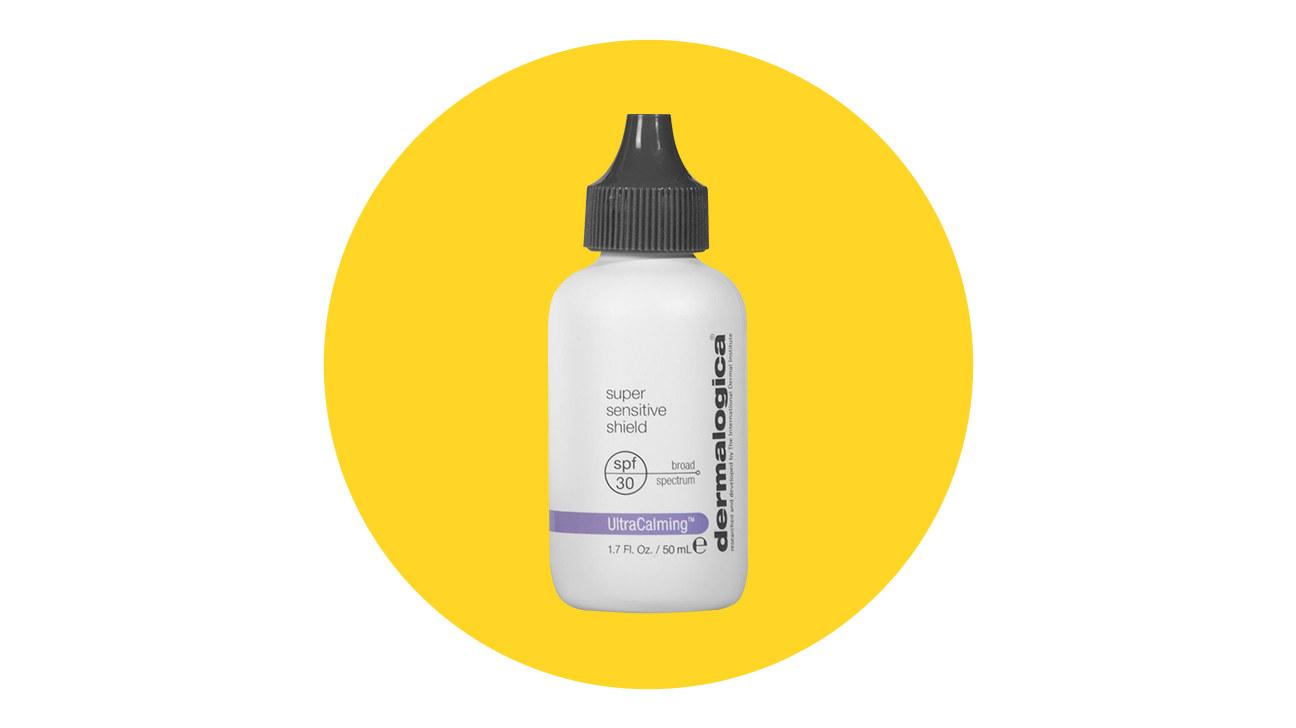
- Price: $$$$
- SPF: 30
- Chemical or mineral: mineral
- Active ingredient: titanium dioxide (7 percent), zinc oxide (9 percent)
- Broad-spectrum: yes
- Water-resistant: no
- Pros: super gentle, great consistency
- Cons: pricey
If you have sensitive skin, sunscreen is a catch-22. Using it keeps your already-angry skin from rebelling further, but some formulas can cause hella irritation. Not this one, though!
Dermalogica Super Sensitive Shield doesn’t just protect you from sun damage. It can also help reduce itching, burning, and flaking of skin. It’s formulated with oats and botanical extracts and contains no artificial colors or fragrances. Ooh la la!
Reviewers like the middle-of-the-road consistency — not too thick or too thin. And users with sensitive skin can’t rave enough about this particular formula. A few people do note that it has a greasy feel.
The bad news? It’s on the pricier side — but a little goes a long way. It’s also not water-resistant, so make sure to reapply immediately after swimming or working up a big sweat.
Want more face sunscreens? Check out our full roundup here.
Best sunscreen for darker skin tones
Black Girl Sunscreen
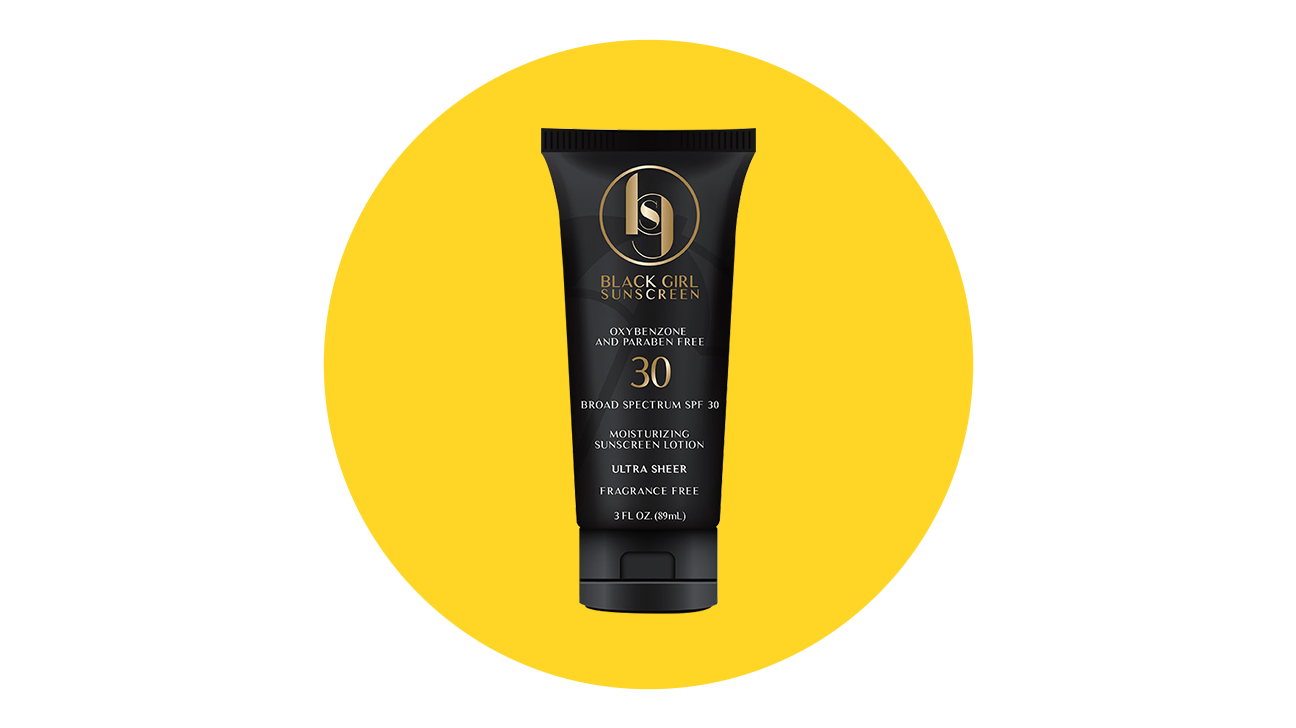
- Price: $$
- SPF: 30
- Chemical or mineral: chemical
- Active ingredient: avobenzone (3 percent), homosalate (10 percent), octisalate (5 percent), octocrylene (2.75 percent)
- Broad-spectrum: yes
- Water-resistant: yes
- Pros: lightweight, no residue
- Cons: might not be good for the face
A lot of sunscreens (mostly the mineral-based kind) leave behind a white residue. Thankfully, Black Girl Sunscreen has you covered (literally). The Black-owned company is known for its amazing formula that has a sheer, silky texture and dries clear.
Another perk: It’s infused with jojoba and avocado 🥑. Yum.
Just keep in mind that SPF 30 isn’t the strongest stuff on the market — though it does meet the minimum recommended SPF. Reapply throughout the day for the best protection.
Reviews for this sunscreen are ultra-positive overall. But a few negative reviews say the sunscreen caused breakouts, and one mentions that the formula works great everywhere except the face.
Best powder sunscreen
Colorescience Sunforgettable Total Protection Brush-On Shield
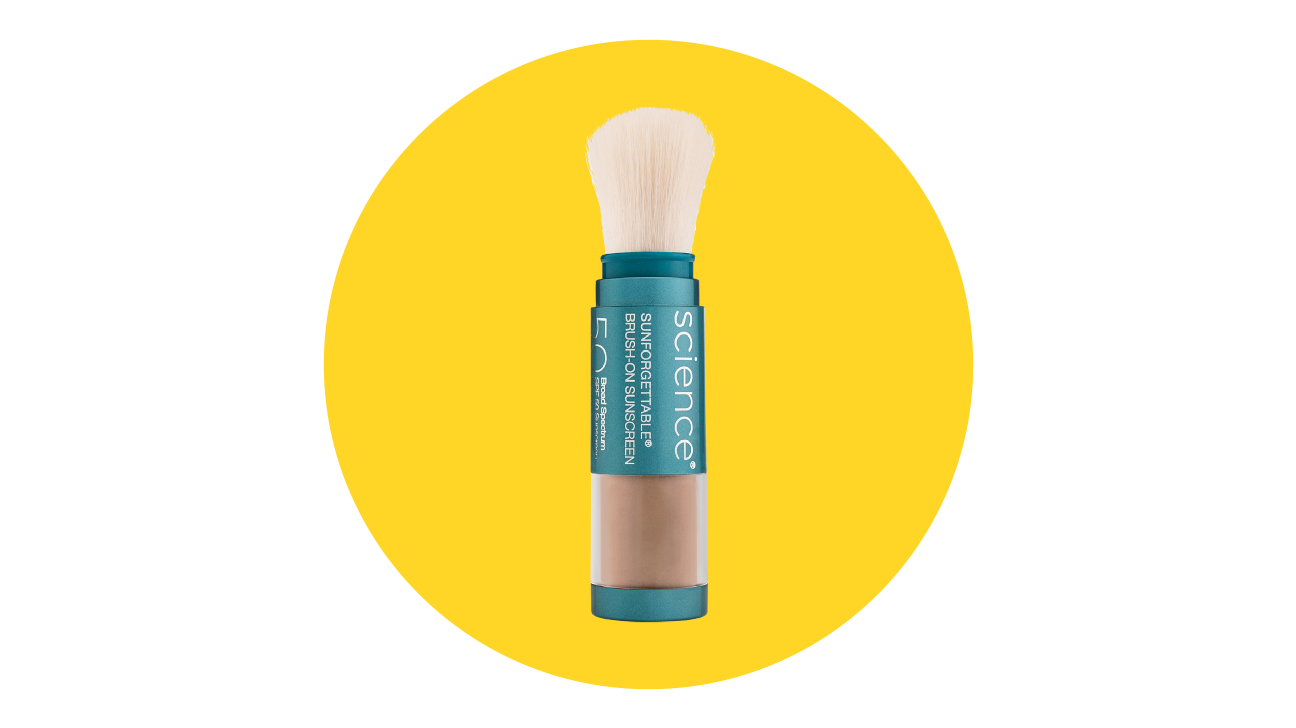
- Price: $$$$
- SPF: 50
- Chemical or mineral: mineral
- Active ingredient: titanium dioxide (22.5 percent), zinc oxide (22.5 percent)
- Broad-spectrum: yes
- Water-resistant: yes
- Pros: great for sensitive skin, provides makeup-like coverage
- Cons: brush applicator is hard to use, according to some reviews
This handy-dandy mineral sunblock comes in a cute little tube. It’s 100 percent chemical-free and has a built-in brush. Its antimicrobial bristles keep it fresh.
Colorescience Sunforgettable Total Protection Brush-On Shield comes in four shades and can complement a wide range of skin tones. It’s also paraben-free, sulfate-free, and vegan.
One downside? The brush. While it seems like a great way to apply sunscreen, some people have a hard time getting used to this applicator. But reviewers love that the product goes on sheer and still manages to conceal imperfections and reduce redness.
Best sunscreen for oily and acne-prone skin
EltaMD UV Clear Facial Sunscreen Broad Spectrum

- Price: $$$$
- SPF: 46
- Chemical or mineral: combo
- Active ingredient: zinc oxide (9 percent), octinoxate (7.5 percent)
- Broad-spectrum: yes
- Water-resistant: no
- Pros: no greasy residue, gentle formula, no white cast
- Cons: a little pricey, not water-resistant
If you already deal with acne, you prob don’t want to look like a lobster on top of that 🦞. And we know you don’t want to apply a greasy, shiny product on your already-oily face. EltaMD UV Clear Facial Sunscreen will give you broad-spectrum protection without triggering a breakout.
It has lactic acid, a chemical exfoliant, which can help curb pore crud. Meanwhile, hyaluronic acid helps draw moisture to the skin. On top of that, it’s loaded with niacinamide, a form of vitamin B3 that may reduce redness.
But what do actual users have to say? People love that it doesn’t leave the dreaded white cast common to many mineral sunscreens. It’s also lightweight and nongreasy and has a matte finish.
The bummer? It’s a little on the pricey side. It’s also not water resistant, so you’ll need to reapply often if you get sweaty or swim.
Best scalp sunscreen
Supergoop! Poof 100% Mineral Part Powder
- Price: $$$$
- SPF: 35
- Chemical or mineral: mineral
- Active ingredient: zinc oxide, silica, and vitamin C
- Broad-spectrum: yes
- Water-resistant: no
- Pros: added hair-friendly ingredients, nongreasy
- Cons: not great for certain hair colors
When was the last time you thought about your scalp? Unless you’re wearing a hat 24/7, your scalp is just as exposed to the elements (sun included) as your skin. But most people totally forget to protect this sensitive spot.
Plus, if you have longer hair that you part in the same place every day (welcome back, middle part 💗), a day in the sun can burn the F out of the exposed skin in your part.
Gotta respect a product that multitasks. This sunscreen offers SPF 35 protection specifically for your scalp. It also contains vitamin C (a powerful antioxidant) and silica, which absorbs excess oil around the hairline.
More goodness: The formula is vegan and helpful for people with dry scalps.
Caveat: If you have dark hair, it can make your locks look gray. Oops.
It’s also not water-resistant and is only supposed to be used on dry hair, so it’s not the best option for beach days.
Best sunscreen for under makeup
Glossier Invisible Shield Daily Sunscreen
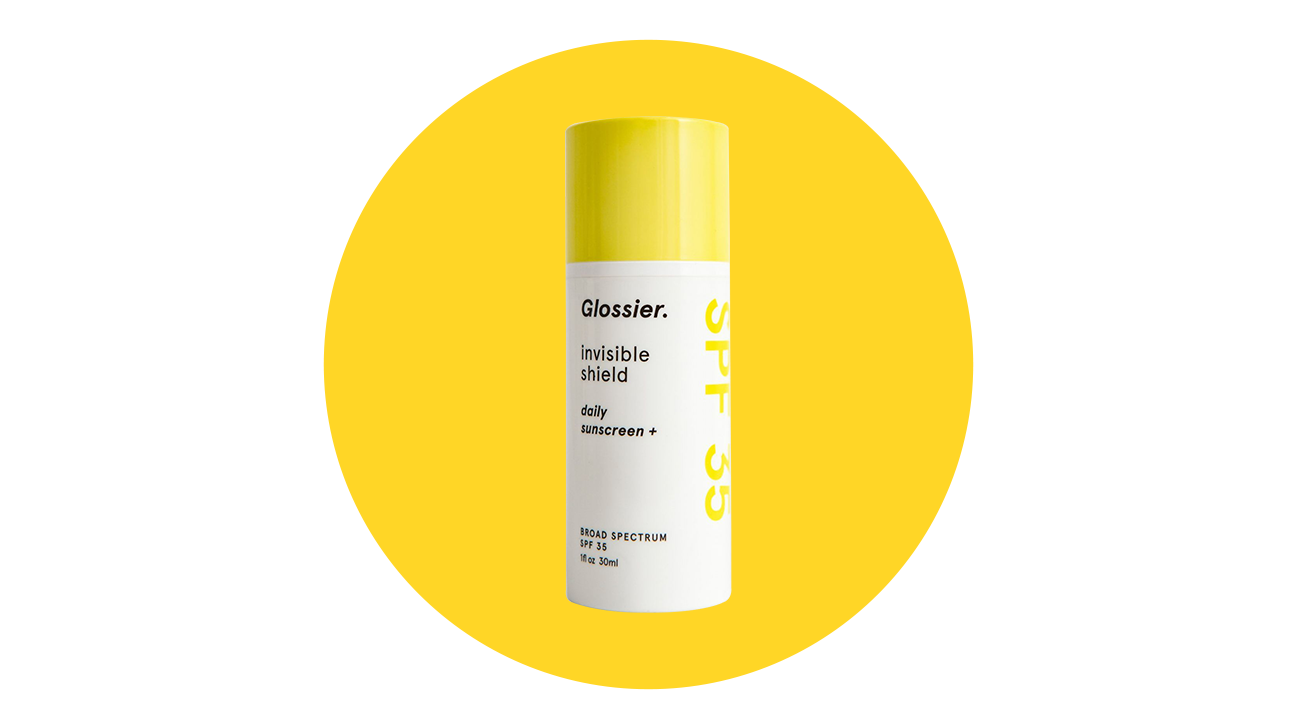
- Price: $$$$
- SPF: 35
- Chemical or mineral: chemical
- Active ingredient: avobenzone (3 percent), homosalate (6 percent), octisalate (5 percent)
- Broad-spectrum: yes
- Water-resistant: no
- Pros: invisible, lightweight, hydrating
- Cons: expensive
This bad boy is an actual superhero. Its power: total invisibility. The lightweight formula is fantastic for any skin tone. It’s more like a serum than an actual lotion and easily absorbs into the skin. It’s also full of antioxidants that help neutralize free radicals.
The best part? Because it’s clear, it’s a good option to wear under makeup — especially for events where you know you’ll be taking a ton of pictures (it’s wedding szn!). Products that leave a white cast can make your face look paper-white in photos with the flash on.
People like the nongreasy, lightweight formula and appreciate that the scent isn’t overpowering. The downsides: It’s way expensive for a product that’s intended for daily use. It’s also not water-resistant, so it’s not a good choice for getting wet.
How to choose the right sunscreen for you
Here’s what to think about when shopping for SPF:
- Skin tone. Most mineral sunscreens leave a white cast, which isn’t ideal for people with darker skin tones. If you have darker skin, consider either a chemical or combo (chemical and mineral) sunscreen since these tend to be a bit less opaque.
- Activity. The AAD recommends opting for sunscreen that’s water-resistant and points out that no product is legit waterproof. That’s really just a marketing ploy. No matter which sunscreen you pick, you’ll also need to reapply every so often — every 2 hours if you’re working up a sweat or swimmin’.
- Skin type. People with sensitive skin, beware — chemical sunscreens are more likely to make your skin 🤬🤬🤬🤬🤬. Go with a mineral sunscreen, and look for one that’s dermatologist-tested and noncomedogenic. If you have REALLY reactive skin, talk with a derm for recs.
- Area of skin. If you don’t have sensitive skin, you can use pretty much any high quality sunscreen on your body and face. Otherwise, pick a sunscreen specifically formulated for the face. These are usually oil-free and easier to rub in.
How to apply sunscreen the right way
OK, yes, you probably have the basics down: Rub lotion onto skin and/or spray sunscreen onto body and rub in.
But here are some other things to know about sunscreen application:
- Apply sunscreen at least 15 minutes before sun exposure. It needs time to absorb into your skin before it’ll fully protect you.
- According to the AAD, you need at least 1 full ounce of sunscreen to cover sun-exposed areas of your body. (For you visual learners, that’s a whole shot glass full.)
- Cover any area of skin that isn’t protected by clothing. Don’t forget your lips, ears, eyelids, and hands; the back of your neck; and the tops of your feet!
- Make sure you’re reapplying every 2 hours.
- Apply sunscreen in the winter and when you’re indoors too — especially if you have lots of windows in your home.
- Don’t expect sunscreen to do all the work. The AAD also recommends staying in the shade, wearing a hat and sunglasses, and covering up as much as possible.
- Resist the urge to stock up on sunscreen in bulk. These products lose their sun-blocking abilities over time, so keep an eye on expiration dates.
Frequently asked sunscreen Qs
What does SPF mean?
SPF stands for “sun protection factor.” It’s a rating of how well a sunscreen will protect you from UVB rays — the kind that cause sunburn.
FYI: SPF 30 blocks up to 97 percent of UVB rays.
But an SPF rating doesn’t tell you anything about a sunscreen’s UVA-blocking abilities, which is why you want to look for the term “broad-spectrum” on sunscreen labels.
Do people with darker skin tones need sunscreen?
YES.
If you have a darker skin tone, you can absolutely experience sunburn and sun damage and get skin cancer — and sun damage may be harder to spot.
What is the most protective type of clothing?
For added protection from the sun’s rays, look for clothing labeled “UPF.”
Dark, thick materials also offer better protection than thin, light-colored ones.
How do I choose the best sunscreen for my face?
Pick a sunscreen that’s specifically formulated for the face. And look for labels like “dermatologist-tested” and “noncomedogenic.”
Also, for people with sensitive skin or conditions like rosacea, mineral formulas are better than chemical ones.
How do I choose the best sunscreen for my kiddos?
Use the same criteria you would if you were buying a sunscreen for yourself: high SPF, water-resistant, and broad-spectrum. Also, go with a mineral sunscreen since they tend to be gentler on the skin and don’t contain ingredients like oxybenzone, which may not be safe for children.
Warning: The FDA cautions against using sunscreen on babies under 6 months. But protecting these little ones from the sun is still important. Keep them covered and in the shade.
How often should I be reapplying sunscreen?
At least every 2 hours. More often if you’re sweating buckets or otherwise getting *moist*.
Does it matter if my sunscreen is expired?
Yes! The active ingredients can lose their oomph over time. Using expired sunscreen means you may not be getting the same protection as promised on the label.
What is benzene, and should I worry about it?
Benzene is a carcinogen that has been linked to leukemia and other blood cancers. Recently, some popular spray-on sunscreens were recalled after independent testing found they contained this no-no ingredient.
Sunscreens shouldn’t contain any benzene, but it can wiggle its way in through the manufacturing process. This isn’t a problem unique to sunscreens, though. The Environmental Working Group wants to see stricter standards for personal care products like sunscreen to eliminate the need for independent testing.
Slather up!
Pick a sunscreen you really like. That way you’ll be stoked to use it every day! Keep a spare bottle in your bag or desk drawer just in case. Your skin will definitely thank you for it. 😎


0 Commentaires